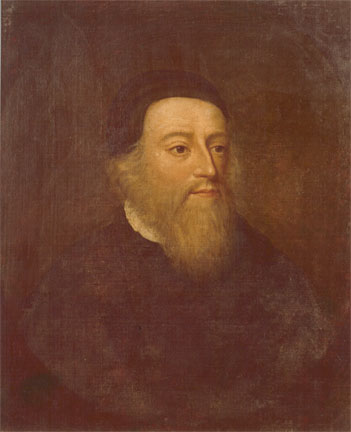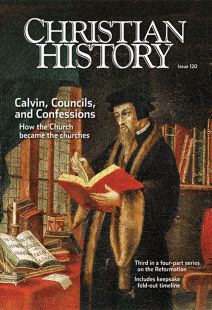Bernard Gilpin, Apostle of the North, Broke a Leg and Saved His Life

[ABOVE: Portrait of Bernard Gilpin, Apostle of the North (1517-1583) by unknown artist—Barnaby Miln's Collection, Edinburgh / released into the public domain by owner, Wikimedia]
LATE IN HIS LIFE, Bernard Gilpin, already worn down by a life of hard work, was knocked over by an ox at the local market. Though placed on bed-rest, he never recovered his strength. It was February 1583, and he knew his last days were approaching.
As the rector of the large parish of Houghton (in northern England), he had exerted himself to spread the gospel, not only among his own flock, but in neighboring districts that were without pastors as well. This entailed much riding and preaching, even in winter. He wore himself out in these labors, earning the nickname “Apostle of the North.”
Now he summoned the poor to his bedside, where he asked them to bear witness that he had always done his best for them. He prayed that God would remember them after he was gone. Indeed, examples of his concern for the poor were never hard to find. On one occasion, he saw a poor farmer’s horse drop dead at the plow and immediately dismounted his own horse and gave it to the man. He had also been known to give his own cloak to a shivering beggar, and for years he fed the destitute at his own expense on winter Sundays.
After parting with the poor, Gilpin called for his students, urging them to make the most of their opportunities for study so as to qualify themselves for useful tasks in the world. Lastly he pleaded with several people who had hardened their hearts against God. He then spent his remaining hours in prayer, assuring his friends that Christ had brought him much peace.
Gilpin’s entire career had been shaped by dedication to Christ. Exposed to Erasmus’ teachings at Oxford, he had moved away from Catholicism and toward Reformation views, but struggled within himself before taking Church of England vows. Because Houghton was a coveted parish with a good income and a house fit for a bishop, envious churchmen looked for a way to oust him and angled to obtain the living for themselves. They submitted a list of twenty-two accusations to Bishop Bonner, Queen Mary’s point man for persecuting Protestants.
Bonner summoned Gilpin to London to be tried for his theological views. Fortunately, Gilpin broke his leg along the way. Before he could recover, Queen Mary died and Elizabeth came to the throne. She offered Gilpin the bishopric of Carlisle but he turned it down, preferring to continue the work he had begun in his own parish. He died on this day, 4 March 1583, beloved of his people.
—Dan Graves
— — — — —
For a summary of the English Reformation, see Christian History # 120 "The rest of the story."






